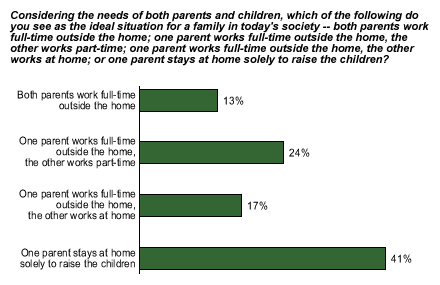Every year or so, it seems, a definitive new study reveals that daycare is either good or bad for children. According to a recent analysis of the government's most comprehensive study of daycare and early childhood development, the Study of Early Child Care (conducted by the National Institute of Child Health and Human Development), "In terms of cognitive and language development, researchers found no benefit for children in exclusive care by their mother." This particular study refutes another government study, Maternal Employment and Child Cognitive Outcomes in the First Three Years of Life, that found increased intelligence among children whose mothers stay home with them for their first nine months. These findings help fuel the "mommy wars" -- the endless debate about whether mothers should work outside the home.
As most mothers (62% according to the Bureau of Labor Statistics) work outside the home, this is a topic of immediate importance to many. In April 2001*, Gallup asked Americans what they thought about working mothers. The poll indicates that, though the number of Americans who feel one parent should raise the children full time is on the rise, so is the number who feel it makes no difference which parent it is.
To Work or Not to Work?
Gallup asked a highly detailed question: "Considering the needs of both parents and children, which of the following do you see as the ideal situation for a family in today's society -- both parents work full-time outside the home; one parent works full-time outside the home, the other works part-time; one parent works full-time outside the home, the other works at home; or one parent stays at home solely to raise the children?" The results indicate that people have put a lot of thought into the ideal domestic arrangement.
Over time, opinion on this matter has shifted. A plurality of Americans (41%) now thinks one parent should stay at home solely to raise the children, a rise from 33% in 1989. The biggest change has been a large drop in the percentage who said that one parent should work full time and one part time, from 42% in 1989 to 24% in the more recent poll.

Should Dad Stay Home?
The term "working father" has yet to infiltrate the American vernacular the way "working mother" has -- and there aren't many studies about working fathers' impact on children, either. When those who said just one parent should work full time outside the home (with the other working part time or working at home) were asked which parent should work outside the home, most, 69%, said it does not make any difference. Thirty percent said the man should work outside the home, and just 1% said the woman should do so.
Those who said one parent should stay at home to raise the children were asked the follow-up question, "Which parent do you think should stay home solely to raise the children -- the husband, the wife, or doesn't it make any difference?" The majority, 55%, said it does not make any difference, but there is an overwhelming preference for the wife (43%) over the husband (1%). These numbers have shifted in favor of working mothers, as well. In 1991, the majority of respondents who thought one parent should stay at home to raise the children (63%) indicated the wife should do this, with 3% saying the husband and 34% saying it did not make any difference.
Key Points
Although there may never be a definitive answer on the effects of daycare on children's development, more Americans today are accepting of the idea of the mother working full time, even if that means the father would have full-time child care duties.
*Results are based on telephone interviews with 1,015 national adults, aged 18 and older, conducted April 20-22, 2001. For results based on the total sample of national adults, one can say with 95% confidence that the margin of sampling error is ±3%.